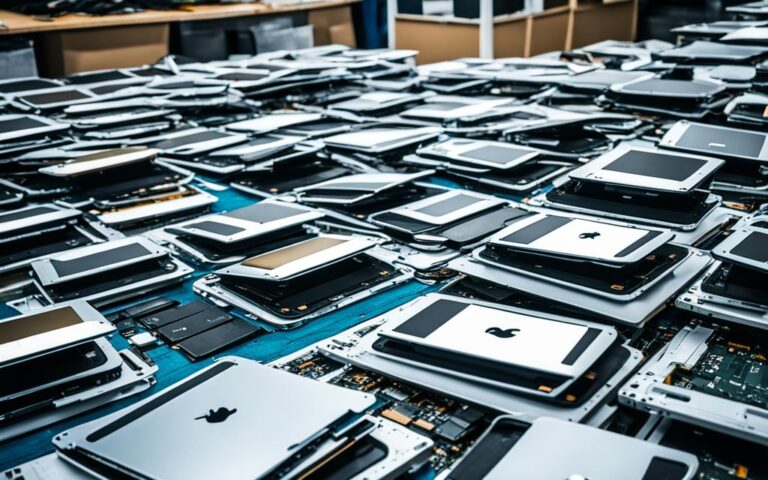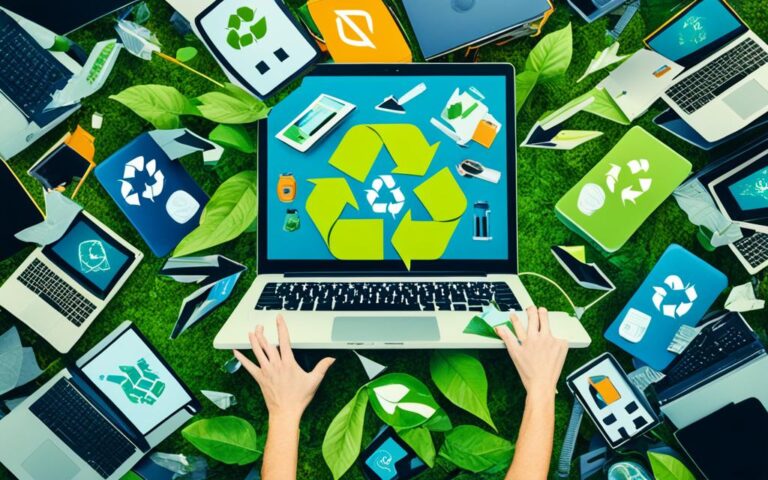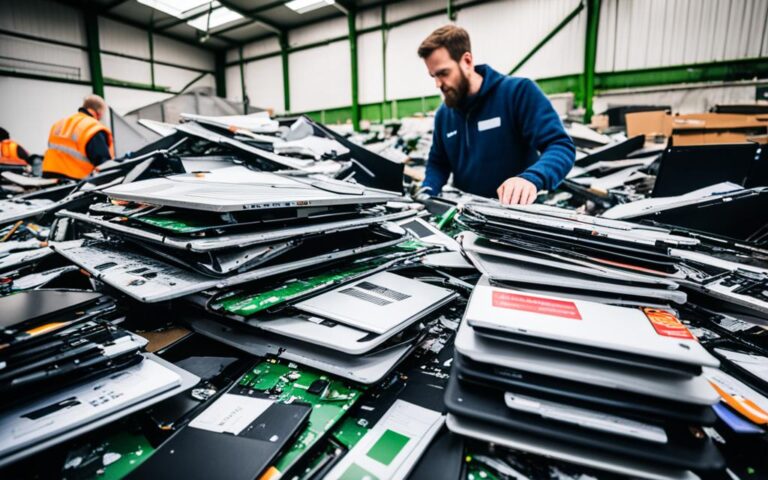The Environmental and Social Impact of Laptop Recycling
Laptop recycling has a significant impact on the environment and society. As technology advances and laptops become more prevalent, the need for proper disposal and recycling of these electronic devices grows. Understanding the environmental impact of laptop recycling and the social impact of laptop recycling is crucial to promoting sustainable practices and avoiding negative consequences.
In this article, we will delve into the environmental implications of laptop disposal, including the effects of discarding laptops in landfills and the importance of proper computer recycling. Additionally, we will discuss the social and economic benefits that arise from responsible laptop recycling.
Environmental Impact of Laptop Disposal
Improper disposal of laptops can have severe environmental consequences. These devices contain hazardous materials, including heavy metals like lead, mercury, cadmium, and beryllium. When laptops are left in landfills, these toxic substances can leach into the soil and water, contaminating ecosystems and posing risks to human and animal health. The impact of electronics on the environment is significant, as the manufacturing process of laptops also contributes to pollution and resource depletion.
The use of fossil fuels and the extraction of raw materials during laptop production release greenhouse gases and contribute to climate change. Additionally, the extraction of rare earth minerals, such as coltan and gold, required for laptop manufacturing, can result in deforestation and habitat destruction in mining areas. The disposal of laptops without proper recycling further exacerbates these environmental issues.
“The improper disposal of laptops contributes to pollution, resource depletion, and poses risks to both the environment and human health.”
Proper laptop disposal is crucial for mitigating the environmental impact of computer disposal. Recycling laptops allows for the recovery of valuable materials, including precious metals, plastics, and glass, reducing the need for new resource extraction. Responsible recycling initiatives ensure that these materials are safely processed and reused, conserving natural resources and energy.
Furthermore, promoting the practice of recycling laptops rather than disposing of them in landfills helps alleviate the strain on waste management systems and minimizes the growing volume of electronic waste. Recycling facilities play a vital role in this process by employing specialized techniques to handle e-waste, ensuring the safe extraction of valuable components and minimizing environmental contamination.
The Urgency of Proper Laptop Disposal
The urgency to address the environmental impact of computer disposal cannot be overstated. As technology continues to advance, the demand for laptops and other electronic devices increases, resulting in a corresponding rise in e-waste. Without proper disposal practices in place, this exponential growth of electronic waste presents a significant threat to the environment and human well-being.
By adopting responsible laptop recycling habits and supporting recycling facilities, individuals and organizations can contribute to a more sustainable and environmentally conscious society. The next section will delve into the health risks associated with improper laptop disposal, shedding light on the detrimental effects on human health and the importance of safe handling and disposal practices.
Health Risks of Improper Laptop Disposal
Improper disposal of laptops can pose significant health risks to both humans and animals. It is crucial to handle and dispose of these devices carefully to protect human health and prevent environmental contamination.
Computers contain hazardous materials, including heavy metals such as mercury, lead, beryllium, and cadmium. Exposure to these substances can lead to various health issues, including:
- Skin problems
- Kidney and brain damage
- Lung diseases
- Cancer
The toxins released from e-waste landfills can also have detrimental effects on human health, from skin cancer to respiratory illnesses. These health risks extend to animals as well, as they can come into contact with contaminated soil and water.
Proper laptop disposal is essential to mitigate these health hazards. By ensuring laptops are recycled or disposed of in an environmentally responsible manner, we can protect ourselves, our communities, and the planet as a whole.
Quote:
“Improper disposal of laptops not only poses health risks to humans but also causes significant environmental contamination.” – Dr. Rebecca Green, Environmental Scientist
Health Risks of Improper Laptop Disposal
| Health Risks | Effects |
|---|---|
| Skin problems | Rashes, irritations, and dermatological issues |
| Kidney and brain damage | Impaired organ function and neurological disorders |
| Lung diseases | Respiratory illnesses and reduced lung function |
| Cancer | Potential development of various forms of cancer |
It is crucial to raise awareness about the health risks associated with improper laptop disposal and prioritize responsible e-waste management to safeguard public health and the environment. By adopting proper disposal practices and supporting initiatives that promote recycling and safe handling of electronic devices, we can minimize the hazards of e-waste and create a healthier, more sustainable future.
Benefits of Proper Laptop Disposal
Proper laptop disposal offers numerous benefits that contribute to a more sustainable future. By recycling and reusing laptops and their components, we can conserve valuable resources and reduce the need for raw material extraction. This not only helps to protect the environment but also reduces the energy and water consumption associated with manufacturing new devices. By extending the lifespan of laptops through recycling, we can significantly reduce electronic waste, which is crucial considering the escalating volume of discarded electronics.
E-waste is a growing problem globally, with millions of tons ending up in landfills each year. Recycling laptops helps to save valuable landfill space and prevent the potential release of hazardous materials into the environment. Laptops contain various metals, including mercury, lead, and cadmium, which can contaminate soil and water when not properly disposed of. By recycling laptops, we can recover these valuable metals and reduce the demand for new resource extraction.
“Recycling one million laptop computers saves the energy equivalent to the electricity used by more than 3,500 homes in a year.”
H3: The Environmental Benefits of Laptop Recycling
Laptop recycling plays a significant role in reducing greenhouse gas emissions and mitigating climate change. The production of new laptops requires a significant amount of energy and resources, including rare earth minerals and precious metals. By recycling laptops, we can conserve these resources and reduce the carbon footprint associated with manufacturing.
In addition to the environmental benefits, responsible laptop recycling also presents economic advantages. The proper management of e-waste creates employment opportunities in waste collection, sorting, data destruction, and recycling. This contributes to the growth of the recycling industry and stimulates the economy. Furthermore, the recovery of valuable materials from laptops, such as gold and silver, can generate revenue and foster a circular economy.
By choosing to dispose of laptops responsibly and supporting recycling initiatives, we can make a positive impact on the environment, conserve resources, and create a sustainable future.
The Role of Recycling Facilities
Recycling facilities play a significant role in responsible e-waste management, ensuring the proper disposal of laptops and other electronic devices. These facilities provide controlled environments for handling e-waste, employing processes that prioritize the extraction of valuable materials while minimizing environmental contamination.
By supporting and promoting recycling facilities, we can contribute to a more sustainable future and prevent harmful impacts on our environment.
The Importance of Recycling Facilities
Recycling facilities serve as crucial hubs for responsible e-waste management. Here’s why they are essential:
- Safeguarding the Environment: Recycling facilities provide controlled environments where laptops and other electronic devices can be safely dismantled and processed. By extracting valuable materials through proper recycling practices, these facilities reduce the need for new resource extraction, conserve vital resources, and minimize pollution.
- Minimizing Environmental Contamination: Through advanced technologies and specialized processes, recycling facilities can prevent the release of hazardous substances into the environment. This helps protect soil, water, and air quality and mitigates the potential health risks associated with improper e-waste disposal.
- Job Creation and Economic Growth: Supporting recycling facilities stimulates local economies by creating job opportunities in waste collection, sorting, data destruction, dismantling, and recycling. These facilities contribute to sustainable development, allowing communities to thrive while promoting responsible e-waste management.
By partnering with recycling facilities, individuals, businesses, and governments can actively contribute to responsible e-waste management and address the growing concern of electronic waste.
“Recycling facilities are vital components of a circular economy, ensuring that valuable resources are reused, reducing the demand for new materials, and minimizing the environmental impact of e-waste disposal.” – GreenTech Solutions Magazine
| Benefits of Recycling Facilities | Supporting Fact |
|---|---|
| Conservation of Resources | Recycling one million laptops saves enough energy to power over 3,500 homes for a year. |
| Reduction of Pollution | The proper recycling of lead-containing laptops prevents the release of approximately 3,000 kilograms of lead into the environment. |
| Economic Growth | The recycling industry supports over 30,000 jobs in the United Kingdom alone. |
Supporting and promoting recycling facilities is crucial in ensuring responsible e-waste management. By investing in these facilities, we can make a positive impact on the environment, create sustainable jobs, and build a more circular economy.
Social and Economic Opportunities of Laptop Recycling
Laptop recycling offers significant social and economic opportunities. By enabling access to affordable computers through the reuse and recycling of laptops, we can bridge the digital divide, ensuring that more people have access to information and communication technology (ICT). This not only enhances connectivity but also empowers individuals to participate in the digital age.
The reuse and recycling sector plays a crucial role in creating jobs and stimulating local economies. By refurbishing and repurposing discarded laptops, we can extend their lifespan and divert them from landfills. This not only reduces electronic waste but also generates employment opportunities in areas such as repairs, refurbishment, and resale. These jobs contribute to the overall economic growth of communities and foster a circular economy, where resources are conserved through reuse and recycling.
Investing in training programs and educational initiatives is essential to provide individuals with the skills needed to excel in the e-waste recycling sector. By equipping people with knowledge and expertise in electronic recycling, we empower them to contribute to economic growth and sustainability. Moreover, these training programs can also raise awareness about the importance of responsible e-waste management and foster a culture of environmental stewardship.
Through laptop recycling and the development of the e-waste recycling sector, we can create a positive ripple effect across society. The social impact of computer recycling extends beyond economic benefits, enabling individuals and communities to thrive in the digital era.
Summary:
- Laptop recycling provides access to affordable computers, bridging the digital divide and enabling greater connectivity.
- Reuse and recycling initiatives create jobs, stimulate local economies, and foster a circular economy.
- Investing in training programs empowers individuals to excel in the e-waste recycling sector, contributing to economic growth and sustainability.
The Global Impact of Laptop Recycling
Laptop recycling is a pressing global issue that necessitates international cooperation and the establishment of effective e-waste management systems. The improper disposal of laptops, particularly in developing countries where informal recycling practices prevail, poses significant environmental risks. Such practices have led to widespread pollution of the air, water, and soil, adversely affecting not only the local population but also the wildlife that inhabits these regions.
The exportation of e-waste to developing countries has further exacerbated the problem, exacerbating the environmental ramifications. The United States and other developed nations must take responsibility for their e-waste, implementing policies that promote responsible recycling, reduce toxic content, and put an end to the illicit exportation of e-waste.
To fully comprehend the scale of the global impact of laptop recycling, it is crucial to examine the specific consequences that arise from improper disposal and ineffective e-waste management. The following table offers a comprehensive overview of the environmental risks associated with current laptop recycling practices:
| Environmental Risks | Consequences |
|---|---|
| Air Pollution | Release of hazardous substances into the atmosphere, resulting in respiratory illnesses and other health issues. |
| Water Contamination | Leaching of toxic chemicals and heavy metals into water bodies, jeopardizing aquatic ecosystems and human health. |
| Soil Degradation | Accumulation of harmful substances in the soil, hindering agricultural productivity and posing risks to food security. |
| Energy Depletion | High energy consumption during the manufacturing and disposal processes, exacerbating resource depletion and climate change. |
These startling environmental consequences demand immediate action and coordinated efforts at both the national and international levels. In addition to implementing stricter regulations and enforcement, the development of sustainable e-waste management systems is paramount. This entails increasing public awareness of the importance of responsible laptop recycling, improving collection and recycling infrastructure, and investing in research and innovation to develop more sustainable technologies.
It is imperative that all stakeholders, including governments, businesses, and individuals, collaborate to mitigate the global impact of laptop recycling. By adopting environmentally-conscious practices and supporting responsible e-waste management initiatives, we can protect our planet, preserve valuable resources, and promote a more sustainable future for generations to come.
Conclusion
Laptop recycling plays a crucial role in addressing the environmental and social challenges associated with improper disposal. When laptops are discarded improperly, they contribute to environmental pollution, pose health risks, and result in the wastage of valuable resources. However, responsible laptop recycling offers a solution to these problems, bringing about resource conservation, pollution reduction, and economic opportunities.
To ensure a sustainable future, it is imperative that individuals, businesses, and governments prioritize proper laptop disposal. By supporting recycling initiatives and implementing effective e-waste management systems, we can mitigate the negative impact of laptop disposal and create a more environmentally conscious society.
Through laptop recycling, we can conserve valuable resources and reduce our reliance on raw material extraction. Additionally, responsible laptop recycling helps in reducing pollution by preventing hazardous materials from contaminating the environment. This not only protects human health but also safeguards ecosystems and wildlife. Moreover, laptop recycling contributes to the creation of new jobs and stimulates economic growth, benefiting local economies.
In summary, the benefits of laptop recycling are far-reaching. By taking simple steps such as recycling our laptops properly, we can help protect the environment, promote human health, and foster economic prosperity. Let us embrace responsible laptop recycling and work towards building a more sustainable and ethical future for all.
FAQ
What is the environmental impact of laptop disposal?
Laptop disposal can have detrimental effects on the environment. Improperly discarded laptops can release hazardous materials such as heavy metals into the soil and water, leading to pollution and contamination. The manufacturing process of laptops also contributes to pollution and resource depletion.
What are the health risks of improper laptop disposal?
Improper disposal of laptops can pose health risks to humans and animals. The heavy metals found in computers, such as mercury, lead, beryllium, and cadmium, can cause various health issues, including skin problems, kidney and brain damage, lung diseases, and even cancer. The toxins released from e-waste landfills can also lead to skin cancer and respiratory illnesses.
What are the benefits of proper laptop disposal?
Proper laptop disposal through recycling and reuse offers several benefits. It conserves valuable resources and reduces the need for raw material extraction. Recycling also saves landfill space, considering the increasing volume of e-waste. Recovering valuable metals from laptops through recycling helps reduce the demand for new resource extraction. Responsible laptop recycling also contributes to the creation of new jobs and stimulates the economy.
What is the role of recycling facilities in laptop disposal?
Recycling facilities play a significant role in the proper disposal of laptops and other electronic devices. They provide controlled environments for handling e-waste and employ processes to safely extract valuable materials while minimizing environmental contamination. Recycling facilities also contribute to local economies by creating job opportunities in waste collection, sorting, data destruction, dismantling, and recycling.
What are the social and economic opportunities of laptop recycling?
Laptop recycling presents unique social and economic opportunities. Access to affordable computers through the reuse and recycling of laptops can bridge the digital divide and provide more people with access to information and communication technology. The reuse and recycling sector also create jobs and stimulate local economies. Investing in training programs and educational initiatives can help individuals acquire the skills needed to excel in the e-waste recycling sector, contributing to economic growth and sustainability.
What is the global impact of laptop recycling?
Laptop recycling is a global issue that requires international cooperation and effective e-waste management systems. Informal recycling practices in developing countries pose significant environmental risks. The export of e-waste to these countries has led to pollution of air, water, and soil, affecting both the local population and wildlife. Developed countries like the United States must take responsibility for their e-waste and implement policies that promote responsible recycling, reduce toxic content, and prevent the illegal exportation of e-waste.
Why is responsible laptop disposal important?
Laptop recycling has a significant impact on the environment and society. Improper disposal of laptops can lead to environmental pollution, health risks, and the loss of valuable resources. However, responsible laptop recycling can help mitigate these issues by conserving resources, reducing pollution, and creating economic opportunities. It is essential for individuals, businesses, and governments to prioritize proper laptop disposal and support recycling initiatives for a more sustainable future.













